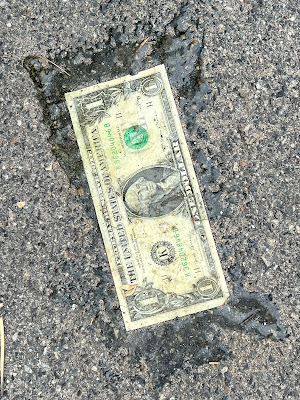 |
| College kid prank: money glued to street |
I’m coming in under the wire on this one. A fun project held me hostage, a nap needed to be napped, and amazon delivered what I hope is a key to better sleep so it just had to be installed. So, it’s now 2-hours before bedtime and time to start taking eyes off the computer, so this is going to be quick.
Deep sleep is important. According to VeryWellMind.com, deep sleep is the third stage of non-rapid eye movement (non-REM) sleep. Deep sleep is also known as slow-wave sleep. This is the stage of sleep where your brain waves are at their slowest. Your heartbeat and breathing also slow down.
More important than its definition is why it’s critical for our health. During this type of sleep, memories are reinforced and body tissues are repaired. This is when our bodies heal. Not getting enough deep sleep is related to several major diseases such as heart disease, obesity, diabetes, and hypertension.
I’ve been wearing a Fitbit for several years but paid little attention to the sleep metrics until recently when I started tracking deep sleep. Recommendations are that between 13 to 23% of our sleeping time should be deep sleep. So, if you sleep 8 hours per night on average, you should get about 62 minutes of deep sleep. After looking at my numbers, I’m not getting enough, so I went looking for ideas about how to improve my numbers.
Funny how almost everything has the same recommendation: eat healthy, exercise regularly, limit caffeine and alcohol. To be a little more specific:
Exercise: Try to get 150 minutes of cardio exercise per week (thanks to my Fitbit, I’ve discovered that a brisk walk in the morning gives me more cardio minutes than the same walk in the afternoon). Intense exercise in the late afternoon or evening can actually interfere with sleep.
Caffeine: Avoid for at least 7 hours before bed.
Eat: More fiber and avoid snacking before bed time.
Alcohol: Avoid before bedtime.
Routine: create a relaxing routine 30 - 60 minutes before bedtime, such as a hot shower, gentle yoga, gratitude journaling.
Bed and bedroom: Cool, dark, and comfortable.
Sound: calming nature sounds (pink noise) has been found to increase deep sleep. Soothing music and binaural beats may help.
The American Sleep Association states, “The most important thing that you can do to increase your amount of deep sleep is to allow yourself adequate total sleep time.”
In our over-busy world, I can hear the eyeballs rolling of workers and parents around the world. Here is an article from Forbes that might help:
12 Effective Tips For Better Sleep As A Busy Professional
So that's it ... sleep well.

No comments:
Post a Comment